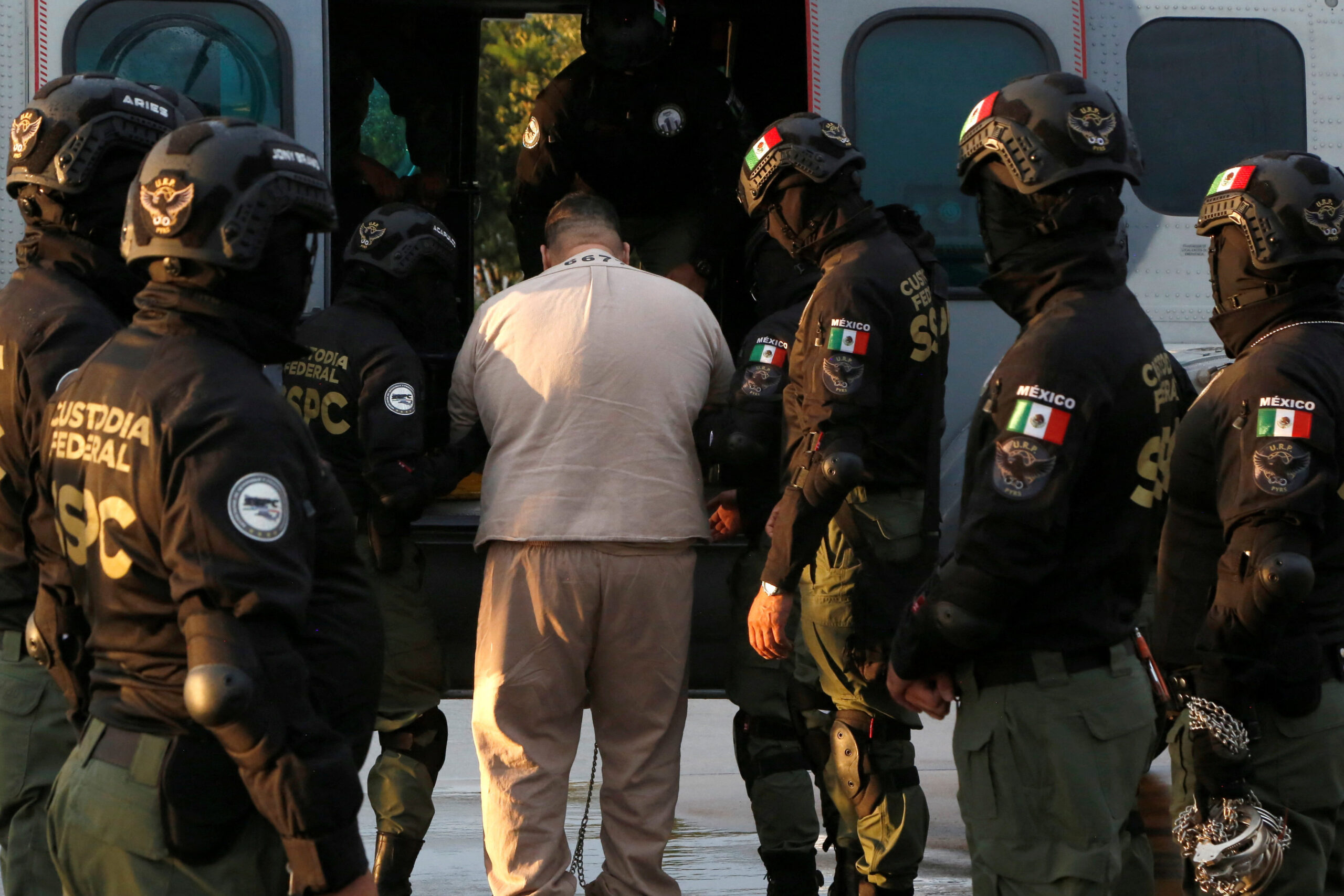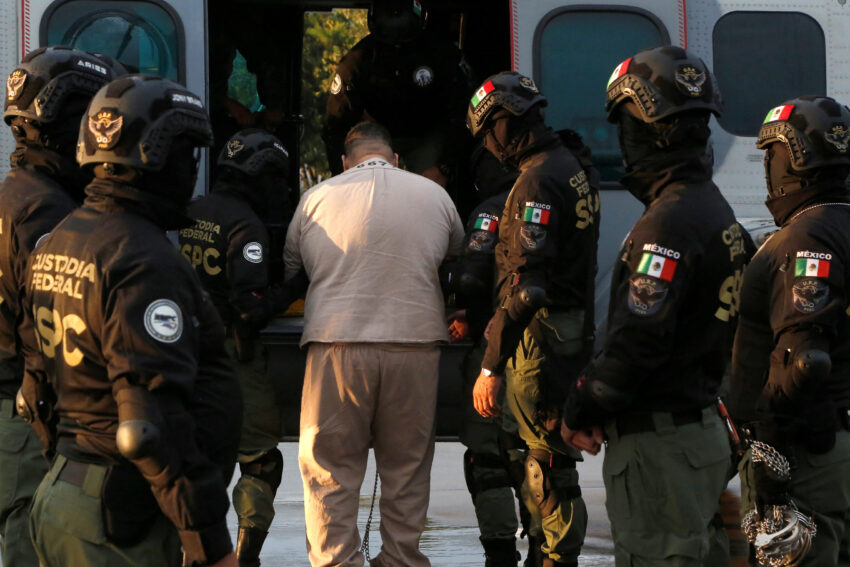
Members of Mexico’s federal forces escort a prisoner wanted in the U.S. for ties to drug-trafficking groups at the Altiplano high-security prison, before transferring them to Toluca International Airport, amid pressure from U.S. President Donald Trump to dismantle drug cartels, in Almoloya de Juarez, Mexico, August 12, 2025. Gabinete de Seguridad de Mexico/Handout via REUTERS
In one of the most significant moves in recent years, Mexico has extradited 26 suspected drug cartel members to the United States, marking a major step in the ongoing battle against organized crime. The operation comes amid political and economic pressure from former U.S. President Donald Trump, who has consistently demanded tougher action on cartels. The Mexico drug cartel extraditions are not only a law enforcement milestone but also a clear statement about the evolving dynamics of U.S.-Mexico relations.
A Landmark Operation Against Organized Crime
The Mexico drug cartel extraditions represent one of the largest coordinated efforts between the two nations in recent history. These individuals, believed to be affiliated with some of the most powerful criminal organizations in Mexico, face charges ranging from large-scale drug trafficking to murder, kidnapping, and money laundering.
U.S. authorities have long sought the transfer of high-ranking cartel suspects to face justice on American soil. Officials argue that prosecution in the U.S. offers a higher likelihood of conviction and longer sentences, limiting the possibility of cartel leaders returning to power after release.
Trump’s Role in the Extradition Push
While the U.S. has pressured Mexico on cartel issues for decades, Trump’s administration took a more confrontational stance. He frequently linked Mexico’s cooperation on security to trade agreements and threatened tariffs on Mexican goods if the country failed to act decisively against criminal organizations.
According to diplomatic sources, the latest Mexico drug cartel extraditions were partly influenced by these threats, alongside ongoing bilateral agreements on law enforcement cooperation. The move sends a message that Mexico is willing to respond to U.S. demands when the stakes—both economic and political—are high.
Who Are the 26 Extradited Suspects?
The list of extradited suspects includes mid-level commanders, financial operatives, and alleged hitmen from various cartels, including the Sinaloa Cartel, Jalisco New Generation Cartel (CJNG), and the Gulf Cartel. Some are accused of orchestrating large cocaine and fentanyl shipments into the U.S., while others are linked to violent incidents along the border.
Bringing these figures to trial in the U.S. is expected to provide prosecutors with opportunities to dismantle networks through plea deals and insider testimony. For the Mexican government, this cooperation also helps reduce the risk of jailbreaks and corruption interfering with the judicial process.
Why Extraditions Are Key in the War on Cartels
Extradition is a powerful tool in combating organized crime for several reasons:
- Secure Prosecution: U.S. courts have the resources and protection to ensure high-profile trials are not disrupted by intimidation or corruption.
- Intelligence Gathering: Suspects facing long sentences in the U.S. are more likely to cooperate in exchange for reduced terms.
- International Message: Large-scale Mexico drug cartel extraditions send a signal to other criminal groups about the risks of targeting the U.S. market.
Impact on US-Mexico Relations
The extraditions are likely to strengthen short-term U.S.-Mexico cooperation, but they also underline the asymmetrical nature of the relationship. While the U.S. benefits directly from removing dangerous figures from the streets, Mexico faces the challenge of maintaining security in regions where these cartels operate.
Some analysts argue that Mexico risks appearing reactive rather than proactive—acting only when under intense foreign pressure. Others note that the Mexico drug cartel extraditions show the country is capable of decisive action when political will aligns with international expectations.
Reactions from Both Sides of the Border
In the U.S., law enforcement agencies have praised Mexico’s decision. The Drug Enforcement Administration (DEA) called the move a “critical step toward dismantling transnational criminal organizations.” Political leaders have framed it as a win for U.S. diplomacy and border security.
In Mexico, reactions are more mixed. While many citizens welcome tougher action against cartels, there are concerns about sovereignty and the optics of bowing to U.S. pressure. Critics argue that the Mexican justice system should be capable of prosecuting these individuals without outsourcing trials to another country.
Will This Slow Cartel Operations?
Experts caution that while these Mexico drug cartel extraditions are a blow to cartel leadership structures, the decentralized nature of modern criminal organizations means operations may continue with new leaders stepping in.
However, extraditions disrupt supply chains, create leadership vacuums, and increase internal mistrust within cartels—factors that can temporarily weaken their grip on territories and drug routes. The effectiveness of this strategy will depend on how quickly both nations can capitalize on the disruption to dismantle networks further.
Trump’s Strategy: Crime, Trade, and Diplomacy
This extradition wave reflects Trump’s broader approach to international negotiations—leveraging economic threats to secure political or security outcomes. By tying trade deals and tariffs to cooperation on security, Trump effectively made the Mexico drug cartel extraditions a litmus test for Mexico’s willingness to tackle organized crime head-on.
The strategy is controversial, with critics warning that linking security to trade risks undermining diplomatic goodwill. However, the recent operation suggests the tactic yielded tangible results in this instance.
Looking Ahead: The Future of Extraditions
The success of this operation could set a precedent for more frequent and larger-scale extraditions in the coming years. U.S. officials are expected to continue pressing for direct custody of high-value targets, particularly as synthetic drugs like fentanyl drive record overdose deaths in the country.
For Mexico, maintaining sovereignty while collaborating effectively will be a delicate balancing act. The Mexico drug cartel extraditions highlight the potential benefits of cooperation but also the political risks of being seen as yielding to foreign demands.
Conclusion: A Defining Moment in Cross-Border Crime Fighting
The transfer of 26 cartel suspects from Mexico to the U.S. is a landmark moment in the fight against organized crime. It showcases the potential of coordinated law enforcement, the influence of political pressure, and the ongoing challenges of dismantling powerful criminal networks.
While it remains to be seen how much this move will disrupt cartel operations in the long term, the Mexico drug cartel extraditions have already reshaped the conversation about U.S.-Mexico cooperation. They stand as both a victory against crime and a reminder of the complex interplay between diplomacy, politics, and justice in the modern world.

